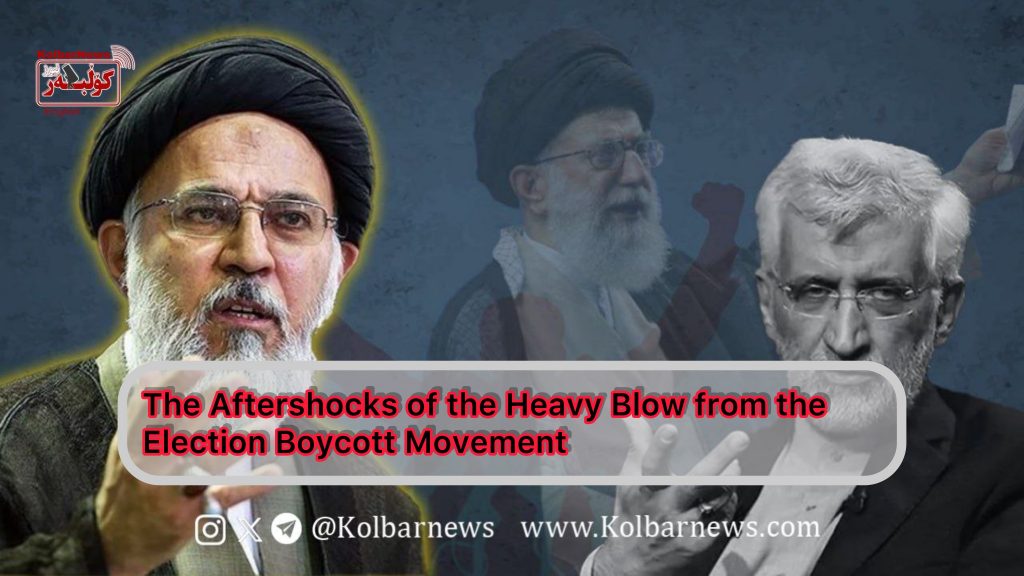
The pressure from social movements and the growing hatred and dissatisfaction with the Islamic Republic regime finally forced Khamenei to halt the purification process of the government halfway. Khamenei, who is seriously engaged in shaping the future leadership of the Islamic regime, now faces a stubborn rival relying on a quasi-fascist and extreme religious organization. This faction is also preparing to take power after Khamenei. Khamenei, sensing the danger of revolutionary uprisings (Women, Life, Freedom) as well as fierce rivals in the succession process, decided to seek refuge with the government reformists and use them instrumentally to settle the succession issue in relative calm. However, the extremist religious faction known as “Paydari,” led ideologically behind the scenes by cleric Seyed Mohammad Mehdi Mirbagheri, a member of the Assembly of Experts, and politically fronted by Saeed Jalili, has become an obstacle to Khamenei’s plan. This faction has launched direct attacks on Masoud Pezeshkian, Khamenei’s appointed president, and indirect attacks on Khamenei.
The Jalili and Mirbagheri faction, essentially remnants of the ultra-reactionary “Hojjatieh” movement, found themselves sidelined in the recent engineered elections. This faction has clashed with so-called moderate Principlists like the well-known figure Mohammad Bagher Ghalibaf and with Pezeshkian, Khamenei’s appointee, and his right-hand man, Zarif. On this matter, a group of worshippers chanted slogans against Zarif, one of Pezeshkian’s closest advisors, during Friday prayers on July 19. Mohammad Ali Abtahi, then head of the Presidential Office during Mohammad Khatami’s era, wrote to Tehran’s Friday prayer leader: “What happened on Friday was the result of hate-mongering in your sermons.”
Reformist political activist Abbas Abdi described the chanting against Zarif at Friday prayers as the result of the defeat of those deprived of privileges. Peyman Barazjani, former assistant to the Minister of Labor in Rouhani’s cabinet, wrote that the worshippers had no issue with the land-grabbing Friday prayer leader and the embezzlers of $3.5 billion from Chai Debsh, but they shouted “get lost” at someone who hasn’t even taken office yet.
Continuing this conflict, on Sunday, July 21, during a pre-session speech in the Islamic Consultative Assembly, Mehdi Koochakzadeh addressed the appointed president: “He speaks of unity while making Zarif, the cause of division, his right-hand man.” This confrontation continues even though Khamenei, just a day earlier on Saturday, July 20, had asked Parliament members to fully cooperate with Pezeshkian’s government.
Government reformist media also launched fierce attacks on the rival faction. On July 20, Etemad newspaper wrote: “There are three hundred representatives in Parliament who, despite having full power, hold no responsibility. The problem with this Parliament and previous ones is that they are not the result of free and fair competition. They are the product of eliminating others from the election scene.”
Media close to Ghalibaf’s faction also fanned the flames of discord. For example, the IRGC-affiliated Javan newspaper wrote that Zarif, the former foreign minister, had defended American interests in the JCPOA negotiations.
On July 21, Zarif responded to his opponents during a speech at the Andisheh Cultural Center. He called his opponents supporters of a “threat-centric” policy and Pezeshkian a supporter of an “opportunity-centric” policy. He said, “We all made mistakes,” but did not specify what those mistakes were.
Naturally, the former foreign minister did not mention the reality that the Republic from the outset was a project of the Iranian bourgeoisie and Western imperialists to counter the Iranian revolution and workers, women, youth, and freedom-loving people. One cannot expect this representative of the bourgeoisie to recognize impoverishing the people of a wealthy country, making thousands of mothers mourners, destroying the environment, enslaving women, turning humanities and education into superstitions, and killing the talents of millions of young girls and boys as mistakes. He and the speaker after him, Abbas Abdi, consider not giving space to the private sector and hostility with the U.S. government as the regime’s key mistakes.
The war at the top is a serious and class-based war. This is why Khamenei’s unifying words always remain as ineffective as soap bubbles on a stormy sea, failing to bring unity and instead causing more division. The expanding struggles of workers, women, justice-seekers, retirees, youth, environmental activists, and freedom fighters against oppression and exploitation, against the backdrop of factional infighting caught in the web of crises, target the entirety of the Islamic regime. The victorious people will establish a system after the Islamic regime where humans, relying on the latest achievements in the humanities and technology and the cooperation of all free and enlightened people in the world, will free themselves and their society from hostilities.

